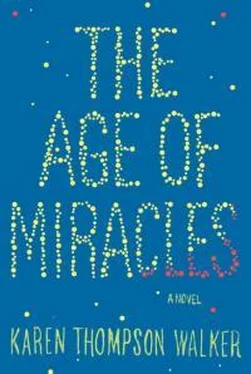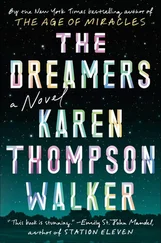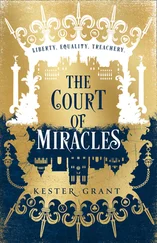The blue light of the television flickered on her face. Kai kept his eyes on the screen.
“You stopped looking?” I said.
“We couldn’t find you,” she said. She turned back to the television. “Josh said he checked the safe room and you weren’t in there.”
Later, I fell asleep in my jeans on the couch. I woke up twice: once when Michaela’s mother and Harry breezed into the house—the tapping of her heels on the tile, the two of them laughing—and later, to the sound of one of the boys—Josh, I think—throwing up in the bathroom.
I was the first one awake in the morning. A pizza box lay open on the counter, and a full carton of melted ice cream sat slumped beside it. Someone had cleared away the beer bottles.
The sun had set overnight. It was dark and cold, and it would be dark all day.
I called home, and my mother sent my father to pick me up. I left without saying goodbye. Someone must have answered the phone when the guard called because my father’s car soon appeared in the circular driveway, headlights blazing.
“Why so early?” he said as I climbed into the car. “Is something wrong?”
The air smelled heavily of smoke. The firefighting planes could not fly without the light, so the fires would burn free for hours. The car radio carried news of one more strange story: An earthquake had struck rural Kansas. It was the first of its size ever recorded there.
“I just felt like coming home,” I said.
Two days before my twelfth birthday, a group of whales washed up on our coastline. Nearby residents awoke one morning to find the whales slumped in the sand, twisting weakly as the tide receded without them. Ten sea creatures: stranded on earth.
Mass beachings were growing common all over the world. In Australia two thousand pilot whales and twelve hundred dolphins were laid out together on one beach. In South Africa, it was killer whales. Eighty-nine humpbacks had run aground on Cape Cod.
Theories abounded. But proof was scarce. The ocean was changing, that much we knew. The currents were shifting. The tides were coming loose. Every high tide crept higher. Every low tide swept lower. The food chain was withering, and new dead zones had formed in certain waters. Starving whales might venture into the shallows in search of food.
But there were some who took a more conservative view.
“These events have occurred throughout history,” said Miss Mosely, our new science teacher, as we shifted on our lab stools.
Under Miss Mosely’s direction, we had stopped updating Mr. Jensen’s solar-system wall. The black butcher paper had begun to fade. The paper planets were curling at the edges, and the moon had fallen from the sky. Under Earth, the label still read 28 hours and six minutes , though the natural days had more than doubled in length since then.
Miss Mosely bent over a laptop at the front of the lab, in gray pencil skirt and white collared shirt, to show us photographs online of hundreds of whales scattered on a nineteenth-century beach.
“See?” she said. “These new beachings might have nothing to do with the slowing.”
But we didn’t buy it. We knew what was coming.
I had begun spending my lunches in the library, land of the friendless, where Trevor Watkins sat hunched at a computer, powering a spaceship with the fuel of correctly answered algebra problems, and Diane Kofsky read romance novels, sneaking cheese puffs from her backpack. There was no eating in the library, and no talking, either.
The only good excuse for choosing to be in the library at lunch was if you had to do homework for the next period. But my homework was done. I tried instead to read, but I couldn’t concentrate on the words. Mrs. Marshall read the newspaper at her desk, looking up now and then to watch the movements of Jesse Schwartz. Maybe we were all in the library against our will, but Jesse was here as punishment for some unknown but easily imagined infraction. He sat alone at a distant table, fidgeting and gazing out onto the quad where he belonged, his natural habitat, the sounds of which reached us here as a faint underwater murmur.
On the first day of honors pre-algebra that year, Mrs. Pinsky had drawn a funnel chart on the whiteboard to illustrate that a sifting process had begun. “You’ve all been placed in the honors class for now,” she said. “But the number of kids who can understand the math is going to shrink every year from now on.” It was that time of life: Talents were rising to the surface, weaknesses were beginning to show through, we were finding out what kind of people we would be. Some would turn out beautiful, some funny, some shy. Some would be smart, others smarter. The chubby ones would likely always be chubby. The beloved, I sensed, would be beloved for life. And I worried that loneliness might work that way, too. Maybe loneliness was imprinted in my genes, lying dormant for years but now coming into full bloom.
About halfway through the period, the glass door of the library swung open. The noise from outside surged in but was quickly sliced away again as the door banged closed.
When I looked up, I was shocked at who was walking down the ramp. He was different from the rest of us in the library—better-looking, better liked. Seth Moreno: I had never seen him in the library at lunch.
He sat down two chairs away from me. I wondered for many minutes whether this nearness was accident or will.
He rested his skateboard against the chair. Diane looked up from her book. You didn’t see many skateboards in the library.
From his backpack, he pulled out a spiral notebook and a mechanical pencil. He turned to a fresh page and smoothed it with his palm.
He began to draw. I could see the shape of a small bird in flight emerging slowly from the tip of his pencil, its wings tucked at its sides. He drew a second bird a few inches higher in the sky. He began to outline a third, erased it, began again.
The sounds of the library were these: the squeaking of our chairs as we breathed, the tapping of Trevor’s computer keys, the muted crunch of cheese puffs beneath the force of Diane’s teeth—and the soft, pleasing scratch of Seth’s pencil on paper.
Outside, someone banged on the window.
“Man,” Seth whispered to me. “I can’t handle it out there, you know?”
He looked over at me and then down at his drawing. His eyelashes formed a thick fringe as he blinked.
“I know,” I finally said.
The bell rang. We began to pack our bags. Diane struggled with the zipper of her backpack. Trevor remained hunched at the computer.
“Trevor,” said Mrs. Marshall from her desk, “the bell has rung.”
And then, suddenly, someone was standing next me: It was Seth, and he was saying something. Seth was saying something to me.
“Hey,” he said.
There’s a certain kind of shock that’s possible only when you’re young. I had the idea that he might be talking to someone else.
“Thanks for the card,” he said.
“Oh,” I said. “You’re welcome.”
“Did you hear about the whales?” he asked.
I had to look up to see his eyes. I worried I would say something wrong, so I said nothing for a moment.
“Yeah,” I said.
He waited for me to say something more. I could feel my face turning red. The flags of every country in the world fluttered from the ceiling tiles above the library.
“Maybe someone can help them get back into the water,” I said.
Seth shook his head.
“They would probably just beach themselves again,” he said. “My dad’s a scientist. He says that when whales beach themselves, there’s a reason.”
Other kids began to trickle into the library. These were the ones with doctors’ notes excusing them from PE.
Читать дальше












